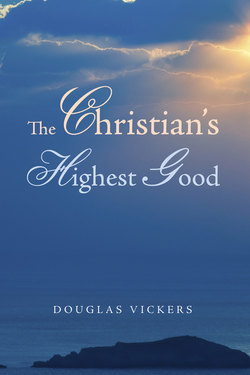The Christian’s Highest Good

Реклама. ООО «ЛитРес», ИНН: 7719571260.
Оглавление
Douglas Vickers. The Christian’s Highest Good
The Christian’s. Highest Good
Table of Contents
Preface
one. The Issue Stated
two. The Identity and Offices of Christ
three. The Coming of Christ
four. The Christian’s Highest Good
five. The Propitiation and. Intercession of Christ
six. Christian Distinctives
seven. Mind, Heart, and Will
eight. Abiding in Christ
nine. The Christian’s Prospect
Bibliography
Отрывок из книги
Douglas Vickers
The exposition of the meaning and implications of fellowship with God takes up a number of underlying and relevant issues. They have to do with both the essential and the official or redemptive identity of Christ, the extent of his propitiatory and intercessory work, and the manner in which those questions have been addressed in historic theology. Considered also are certain trends in thought which have influenced the changing patterns of the church’s statement of its evangel. This has required notice of the assumption of the competence of unaided human reason and the anthropocentric orientation it has fostered, as that has infiltrated its influence into the church’s statement of doctrine.
.....
Some theologians and commentators who have held to the necessity of the grace of God in the movement of the soul to salvation have in several ways, and in semi-Pelagian form, oriented their argument on the concept of the cooperation of man with divine grace. The following example will illustrate the kinds of difficulties involved in such doctrinal formation. There has occurred an “emphasis upon both the initiating power of God’s grace and the need for willing cooperation with it.”22 As to the efficiency of the human will in its fallen state, it is said that while “our own wills [do not] contribute anything towards the attainment of eternal life . . . they have a kind of negative veto which can obstruct the work of salvation.”23 The concept of that negative veto is to be recognized carefully. For it is said in such theologies that “our only capacity for making a contribution to our spiritual renewal is the capacity to say yes or no to what is divinely initiated.”24 There is a “malaise of the fallen human condition” for which there is “no non-Christian remedy.”25 But it appears, in the semi-Pelagian schemes we are currently noting, that the best to be said about the human contribution to righting the condition of things is that “disciplines have to be imposed on the appetites and desires” leading the individual astray, such that the grace of God is inhibited from intervening in the soul in a manner necessary to salvation.26 In something of an apparent contradiction, the author whose conclusion we have just referred to also observes that “Whatever else being saved may involve, it can never possibly put you in the position of being able to tell God his business.”27 But the damage has already been done. For the previously claimed ability of the will to say yes or no to the grace of God has already “told God his business.”
All such theological inventions as these deny in one way or another the sovereignty and the irresistibility of the grace of God. If, however, it is held, consistently with the expansive testimony of the Scriptures, that salvation is by the grace of God alone, then it is held that salvation is a divine monergism. “Monergism” means that only one efficient cause is operative in, and solely capable of bringing to effect, the objective of salvation. The doctrine of salvation that came down to us from the theology of the Reformation is unambiguously monergistic. The argument as to why that is so will be seen to lie at the heart of the scriptural statement of the status of man in his fallen and sinful state and the remedy in the substitutionary work of Christ that God has addressed to it.
.....